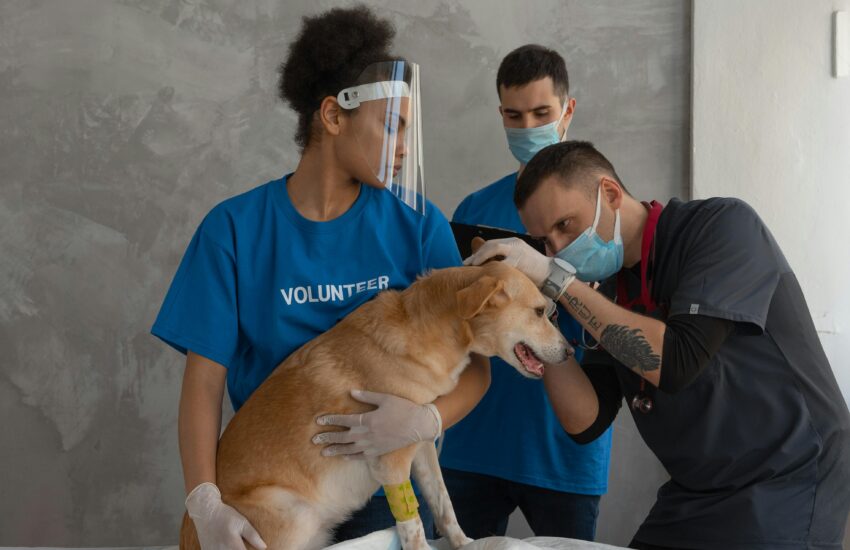Hamster Veterinary Care
Understanding Hamster Health Needs
Caring for your **hamster** requires an understanding of their unique health needs. Regular veterinary care is crucial to ensure that your furry friend lives a long and healthy life. Typically, hamsters can suffer from various health issues ranging from respiratory problems to dental issues. Being aware of the signs of illness and understanding when to seek veterinary help can make a significant difference in your hamster’s wellbeing.
Common Health Issues in Hamsters
Hamsters are prone to several health conditions, including respiratory infections, wet tail (a severe gastrointestinal disease), and tumors. Symptoms such as sneezing, lethargy, or a wet bottom can indicate underlying health issues. It’s important to observe your pet’s behavior and consult a veterinarian if you notice any changes. Regular check-ups can help catch potential issues early, ensuring that your hamster receives timely treatment.

The Importance of a Veterinary Check-Up
Just like any other pet, **hamsters** require annual check-ups. A veterinarian who specializes in small animals can conduct a thorough health examination. During the visit, the vet checks the hamster’s weight, teeth, and overall physical condition. Regular check-ups not only help to identify potential health issues early on but can also provide guidance on proper nutrition and habitat conditions to promote a healthy lifestyle.
Finding the Right Veterinarian for Your Hamster
Choosing the right veterinarian is essential for your hamster’s care. Not all veterinarians have the same level of experience with small animals. Look for a veterinary clinic that specializes in exotic pets or has a vet experienced in **hamster care**. Ask about their experience with hamsters and the common health issues affecting them to ensure that your furry pet will receive the best possible care.
Questions to Ask Your Vet
Before scheduling an appointment, it’s beneficial to prepare a list of questions to ask your veterinarian. Inquire about their experience with hamsters, vaccination protocols, and what to expect during a check-up. You may also want to discuss what types of emergencies they are equipped to handle and the resources they have for small pets.
Cost of Veterinary Care
The cost of hamster veterinary care can vary significantly depending on the services required. Routine visits may be relatively inexpensive, but if your hamster develops a health issue, additional treatments may lead to higher costs. It’s wise to discuss estimates up front and inquire about any payment plans or insurance options for pet care to ease financial strain in the event of an emergency.

Preventive Care for Your Hamster
Preventive care is an essential aspect of **hamster veterinary care**. This includes not only regular vet visits but also proper nutrition, an adequate living environment, and mental stimulation. Ensuring your hamster has a balanced diet, a clean habitat, and enough exercise can help prevent many health issues. Additionally, consider providing toys and enrichment activities to prevent boredom, which can lead to stress and related health problems.
Feeding a Nutritious Diet
The right diet plays a crucial role in maintaining your hamster’s health. A balanced hamster diet typically includes high-quality hamster pellets, fresh fruits, and vegetables, and occasional treats. Be cautious with treats, as too many can lead to obesity and related health problems. Consulting your veterinarian about your hamster’s dietary needs will help you select the best food options.
Creating a Safe and Stimulating Environment
Your hamster’s living environment also influences their health. A spacious, clean cage with appropriate bedding and hiding places is essential for their comfort. Regular cleaning of the habitat and access to exercise wheels and tunnels can keep them engaged and physically active. A well-maintained environment will not only improve your hamster’s physical health but also boost their mental well-being.
Signs That Your Hamster Needs Immediate Veterinary Care
It’s crucial to recognize the signs that indicate your hamster needs urgent veterinary attention. Sudden changes in behavior, such as excessive hiding, lack of appetite, and physical issues like bleeding or difficulty breathing, should not be overlooked. Understanding these warning signs can save your hamster from serious health complications and require prompt treatment from a qualified veterinarian.
Behavioral Changes to Watch Out For
Hamsters are typically social and active creatures, so any noticeable changes in behavior can signal trouble. If your hamster becomes unusually lethargic, stops eating, or exhibits signs of distress, it’s vital to consult a veterinarian. Keeping a daily log of your hamster’s behavior can help you notice any concerning trends before they escalate into more significant health issues.
Physical Symptoms of Illness
Physical symptoms such as fur loss, diarrhea, or eye discharge are significant indicators that your hamster may be unwell. Each of these signs can point to various health problems requiring immediate veterinary assessment. If you observe any physical symptoms, don’t hesitate to reach out to your vet for an evaluation to obtain an accurate diagnosis and appropriate treatment.
Key Takeaways
- Regular veterinary care is essential for maintaining your hamster’s health and well-being.
- Choose a veterinarian experienced with small animals, particularly hamsters.
- Maintain a nutritious diet and a clean, stimulating living environment for your pet.
- Stay vigilant for signs of illness to ensure timely veterinary intervention.
FAQ
1. How often should I take my hamster to the vet?
It’s recommended to take your hamster for a check-up at least once a year. However, if your hamster shows signs of illness or distress, seek veterinary care immediately.
2. What are some signs that my hamster is in pain?
Common signs of pain in hamsters include excessive lethargy, decreased appetite, guarding particular parts of their body, and unusual vocalizations. Observing their behavior closely can help detect pain early.
3. Can hamsters get vaccinations?
Unlike dogs and cats, hamsters are typically not vaccinated against diseases. However, keeping their environment clean and monitoring for signs of illness can help prevent health issues.
4. How do I prepare my hamster for a vet visit?
To prepare your hamster for a vet visit, ensure that you have information about their diet, behavior, and any symptoms you’ve noticed. Transport them in a secure cage that is familiar to them to reduce stress.
5. What should I do if my hamster has a respiratory infection?
If you suspect your hamster has a respiratory infection, such as coughing or difficulty breathing, contact your veterinarian immediately, as these conditions can worsen quickly without treatment.
